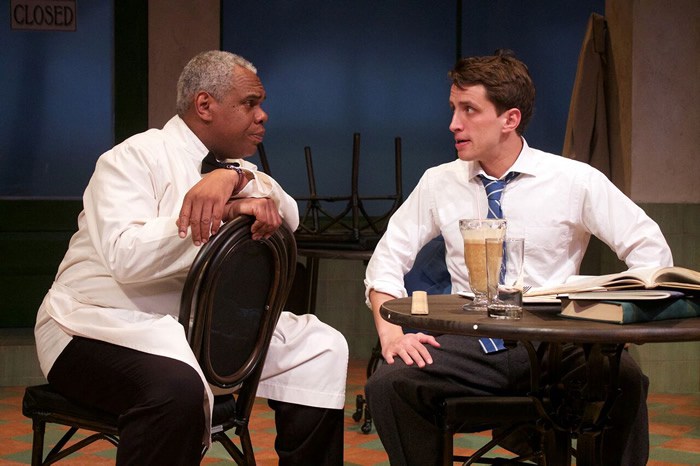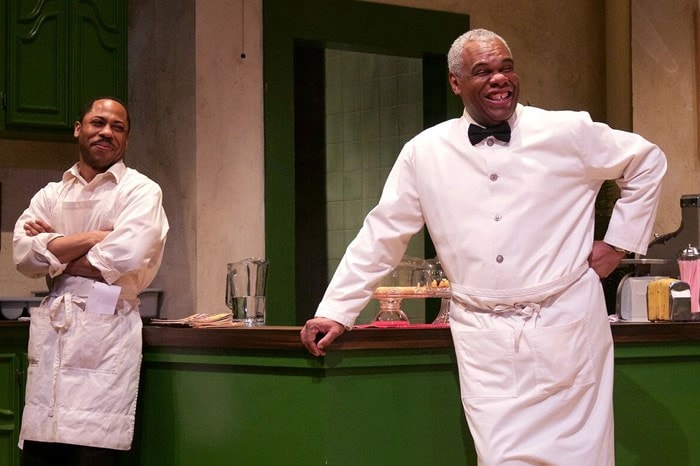On a rainy afternoon in 1950, two middle-aged black servants slowly scrub the floor and wipe tables in an empty South African tea room. They banter about an upcoming ballroom dance competition and the older man, Sam, chides his younger colleague, Willie, about his stiff style and missing dance partner, Hilda. Soon they are joined by Hally, the rakish adolescent son of their employers. The three chatter amiably, but edge nearly unconsciously toward a dangerous chasm. Within the real-time space of less than two hours, Hally prods contemptuously beneath the surface of civility, revealing the corrosive effects of institutionalized racism. The result is devastating for all three characters.

Round House Theatre’s outstanding new production of Athol Fugard’s acclaimed 1982 play, “Master Harold”… and the Boys, comes not a moment too soon in our renewed national dialogue on race. Though set during the era of apartheid, Fugard’s masterwork reminds us that racial bias continues to thrive, not only in South Africa. We need look no further than daily news headlines to see firsthand how fear and loathing shapes the interaction between whites and people of color.
Fugard’s tale is largely autobiographical. Like Hally, the playwright grew up in a chaotic household dominated by a crippled, alcoholic father and a mother who struggled to keep the family afloat. Virtually fatherless, he was taken under the wing of a sagacious black servant who he recalls as “the most beautiful friend I ever had.” But the laws of racial separation that governed South Africa permeate the intimate tea room, thwarting sustained intimacy now that Hally is growing up.
“Master Harold”… and the Boys demands top-flight acting to engage us in its swift and startlingly violent turns. Fortunately, Artistic Director Ryan Rilette, who also directed this play, has found a sensational trio and led them with precision, sharpness, and grace through Fugard’s taut script. Craig Wallace plays Sam with the gravitas, patience, and wisdom required to keep one’s dignity in an unforgiving world. He genuinely loves Hally, and hoped to coax him into a responsible adulthood. He reacts slowly to the teen’s increasingly sharp barbs, but we sense the wellspring of molten lava collecting in his core, ready to erupt when Hally crosses an invisible, yet bright scarlet line.
Willie, the younger and much less worldly servant, is played by Ro Boddie with sometimes comic befuddlement. Willie “knows his place.” He keeps his head down, and never challenges Hally, who he refers to formally as “Master Harold.” Yet he thinks nothing of beating his woman, who he suspects of infidelity. Willie nonetheless has his own dreams. Two weeks hence, he’ll compete on the ballroom floor, in a space where beauty reigns and collisions, as he and Sam note, never happen.
Nick Fruit as Hally is on fire from the moment we meet him. Oscillating wildly from prickly to delicate, cynical to sentimental, Fruit transports us fully into his character’s bedeviled soul. Hally mocks his world’s corruption and decay. Yet he recalls with loving tenderness a perfect day he spends with Sam, flying a kite Sam made with odd bits and parts. His glaring blind spots, however, trump this lovely recollection. How could a black man actually make a kite, he muses out loud. He wished that Sam would stay with him in the park, never realizing that the benches were for Whites Only.

Hally charges through his history book for role models to counter his despair. An indifferent student, he is nonetheless curious as to which famous men have done the most to aid humankind. Napoleon and Jesus are considered. Sam nominates Abraham Lincoln and Hally, incredibly enough, tells him not to be so sentimental. After all, Sam was never a slave. Finally, he and Sam find agreement on Sir Arthur Fleming, the discoverer of penicillin.
Throughout the production, we are suspended within Scenic Designer Meghan Raham’s handsome set, a place reminiscent of artist Edward Hopper’s quiet and lonely interiors, awaiting the next steps along an uncertain road.
With Athol Fugard’s wrenching play, we begin to understand how a culture of racism pervades every pore of every soul that lives within its confines, regardless of whether you are the oppressor or the oppressed. It took Fugard thirty years to tell the story of his upbringing – it was simply too painful to revisit. The fact that it remains relevant today reminds us that we have much work still awaiting us to bridge the divide.
Running time: One hour and 35 minutes, with no intermission.
“Master Harold”… and the Boys plays through May 6, 2018, at the Round House Theatre – 4545 East-West Highway in Bethesda, MD. For tickets, call the box office at (240) 644-1100, or purchase them online.





nick fruit has been stellar on the stage since forever~ this review doesn’t surprise me in the least.
from a fan from savannah